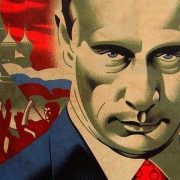For a century Italy has been the laboratory of Western Politics. After World War 1, about 100 years ago Mussolini was the first to realize the importance of joining mass movement, socialistic slogans with nationalistic ambitions. This chemistry proved better grounded than previous internationalist claims of the original socialist movement and spread around very quickly.
Some seventy years later, at the fall of the Berlin Wall Berlusconi changed again the face of politics. Almost a modern Citizen Kane, Berlusconi used the full blast of his media empire, his economic clout combined with a new popular sensibility – feeding on some of the basest instincts of the masses, again effectively predating on youth movement experiences of the 1970s. The combination was extremely successful and possibly it was seminal in inspiring the rise to power of Donald Trump as president of the United States.
Then is the 5 Star Movement and the League government also a new page that will inspire politics worldwide? Certainly the massive use of Social media, bypassing TV and the traditional press is a new phenomenon. But also dropping traditional political divisions of right and left seems in line with worldwide new sensibilities. Then what is happening in Italy?
The following are scattered notes drafted on the basis on conversations with professor Vincenzo Scotti, ex Minister of Interiors, Dean of Link University and allegedly close to the 5 Star Movement (senior partner in present coalition government), and with Giovanni Salvi, Procurator General of Rome. Any misunderstanding and error is exclusively my fault. After months of conversation in Italy I believe they offer interesting perspectives on the ongoing crisis political and social crisis in Italy and how some Italians see the global situation.
A history begun in late 1970s
For Professor Scotti the long wave of Italian history that led to the populist movements may have begun with late 1970s. The end of the Gold Standard brought about a long disruptive season of high inflation.[1] Paul Volker, as head of the FED, used monetary policies, high interest rates, to bring down and control inflation. Anti inflation policies destroyed bargaining leverage for the Trade Unions. Moreover, US Banks, loaded with fixed rates long term real estate loans went bust because of the new environment. Washington allowed a greater measure of liberalization to save the banking system.
Then in the 1990s, real estate liberalization (allowing poorer people to buy houses with cheaper loans), further financial liberalization, sales of US debt internationally and then waste in failing war efforts since 2002, created the mix that brought to the 2008 financial crisis.
This situation brought about the massive market liberalization in the 1980s, just as socialism was the byproduct of the early freewheeling process of capitalism and industrialization in the 1700s. The philosophical inspiration of all this was the Monetarist drive of the Chicago school and the Reagan administration.
Therefore in a few points:
- In the early 1980s, social conflicts were to be resolved by the market and de facto torn away from the public social and political debate.
- It ended politics as it had been conceived for 200 years, since the French Revolution, when the state, social bodies, or public debate mediated between interests and conflicting pressures.
- The bilateral negotiation between social forces was supposed to begin in an intellectual environment where the laws of development and more efficient accumulation of wealth are the dominant principles.
- Ideally, we would return to a situation of early capitalism, of the 1700s in Britain, when the productive forces wanted to affirm their emergence and strength against the constituted interests of the past: the commons of the common people and the privileges of the aristocracy. As the state defended the new productive forces then, in the 1980s the state had to support the new liberalism.
This was combined with the advent of the Internet and of the telecommunications revolution, putting a turbo engine on this liberalization (just as the Industrial Revolution in the 1700s was a consequence and accelerator of Adam Smith’s liberalism). Communication times are shortened, and therefore the processes of decision-making and reflection become more and more efficient, increasingly eliminating the human element and accelerating mechanization.
This freed the productive forces that also helped bring on the fall of the Soviet empire, which in turn freed the geographical limits on the diffusion of new businesses and intensified delocalization. The end of the USSR and the failure of the communist project, therefore, also eliminated an ideological obstacle to monetarist ideas.
This freed up gigantic production dynamics and created an opening for the globalization of markets and finance. People start moving production basis, according to the convenience of production costs. Similarly, taxes were beginning to be paid no longer to a single state, but were spread in various states according to the financial convenience.
Clash of cultures
With hindsight, the efforts of the last two centuries, after the French Revolution, was to create mechanisms of mediation and compromise between market forces and exploitation of people. In this, the radical answer (that goes from Marat-Rousseau to Marx to Lenin) is that the ideal of equality/dictatorship of the proletariat will oppose the heartless rigor of the market rules. This was based on the idea of a general will (interpreted by those workers’ leaders who know) and the redistribution of the surplus labor quota identified by Marxists.
With the end of the USSR, the ideal of readjusting the market mechanism in a positive way (through radical revolution or social democratic reform) collapses. Therefore, the ideal of having a very free market becomes stronger than ever, without barriers that are ideological (socialism in all its forms is swept away) or geographical (the Soviet empire, with its different rules, disappears).
Therefore, an idea of politics that combines thought and heart (a rational project and feeling toward the other), against the absolute market of the late 18th century and the 1980s, and the radical popular movements, falls apart.
In the 1980s Italy becomes the testing ground for experimenting with a post-politics led by television magnate Silvio Berlusconi (in turn inspired by Reagan, a former actor). He promises millions of jobs, like indestructible pots, like forever love promised to a night’s girlfriend. If the pots scratch and break, if at dawn the engagement breaks, well but the pot was still strong, the love of an intense night like was that of a lifetime, and then this is life—like the millions of works that do not materialize.
Politic culture turns into a show. Marxism-maximalism was an ideal, a counterculture that needed a mainstream culture to fight. If the counterculture ends, there is no need for the mainstream culture. In fact, the Marxists wanted to establish a cultural hegemony and become the mainstream culture. Moreover, if mediation between legitimate interests (those of the capital and those of the workers, for example) is superfluous and everything is entrusted to the market, there is no need for a culture to provide social mediation.
Right around the end of communism, popular TV, a medium spreading a “non-culture” that despises high culture was born. Those TV programs were hugely successful because they appealed to an audience that had been forgotten—the ones with little culture, who would barely read any book. In Italy those were Berlusconi’s commercial TV stations, following a trend that had occurred also in America. These stations promoted the idea that non-culture (ignorance, not reading) was a culture, as legitimate as the bookish culture. It was the foundation that eventually led to the spread of “fake news.”
However, Berlusconi was still within the old Italian political mold – he had an organized Party, he moved within the idea of a left-right divide, where the entrepreneur has to look after the interests of the lower classes and mediation is crucial. The 5 Star Movement M5s, born after the 2008 financial crisis, is outside of it—it is the new generation of the policies of absolute rights against the absolute market. In fact, the rise of the idea that market is governed by absolute legitimate rules, brings about the idea that there are absolute rights that mustn’t be crushed by the market – the human rights, the rights of the women, the rights to the water et cetera. In an atmosphere of political mediation rights were the recompense of duties performed (you behave well you have the right to be respected; you work you have the right to your pay). In an environment where market rules for economic growth are paramount the idea of absolute “rights” is the only defense and they are the absolute “speed bumps” on the otherwise unfettered run of free market.
They are no longer connected to duties and responsibilities, as it had been for two centuries, but they are “human,” inherent to man and universal to everyone everywhere. From this, we then go straight to the body, or to life and death; to work; to the preservation of the nation; to maintaining the status quo; the right to water; and questions of identity, ethnicity, and so on. Not all rights can be negotiated, those that are very hot (made of pure emotions and as such not negotiable) become “speed bumps,” of the cold logic of the market.
It is a philosophical move that passes from the policy of ideals (made from ideas, which are from the brain, but also from the heart, i.e. attention to the needs of others) to the policy of emotion (that come of the belly). The ideal has as its premise empathy for the motivations and the malaise of others; the emotions are born and live by themselves, are selfish and possibly impervious to the emotions of others.
It is a crisis of traditional politics: people reject politics, both the holders of wealth and the bureaucrats (godparents of the mechanisms of the market or the state), and the common people “suffer” the policy.
Cracks in the International order
However, while in theory there is seems to be good reason to hark back to a time of political mediation, massive economic innovation is the result of great market freedom. Why Europe doesn’t have tech giants, like in the US or China? Because to have a successful tech company one needs to invest in hundreds of them, and then close them immediately when they don’t perform. In Europe because of trade union issues it is impossible to close down rapidly companies, and banks then don’t want to be sucked in possible failures. So, it is very hard to start new growth engines here, and there is no hope of revolutionary growth. Traditional industries can improve their performance, but also the traditional industries are under performing.
In Europe at the turn of the millennium German-style capitalism, of alliances and great agreement between the parties, ends. In those years at the international level, the new situations also leads to end the politics of multilateral agreements according to political ideals: the UN, Bretton Woods, the IMF, and the European single market, are weakening because were based on an agreement of shared ideals between states.
Traditional reformers face a crisis because it reduces the space to mediate. There are the needs of the market and production on the one hand, with absolute needs to which others must adapt. On the other hand, this absolutizing of market needs—cold, unsentimental, and for this reason expressed in numbers—gives rise to an absolutizing of “rights.”
The right of M5s and the future of politics
People who reject politics (considered at the service of “strong powers”: rich men, politicians, et cetera) push for a revolution based on rejection, on the absolutizing their own particular thinking and feeling, and on the EXIT emotion. They want change (without content) and make calls for the recognition of dignity, laws, specificity, or a particular identity.
In this, politics ceases to be a representation of the will of a part of society that tries to compromise with another part. Thanks to the harnessing of emotional politics through the Internet, politics becomes a direct megaphone of “popular will.”
Today M5s claims parliamentary politics is superfluous. This is a consequence of the policies dictated by daily opinion polls, fairly close relatives of online surveys, and not of medium- to long-term programs.
The problem is that there is no reference culture to address even basic issues, and technically politics cannot do without culture. This is permissible when there are very strong apparatuses, like in America. There, a president-elect may have no culture, but officials are all career professionals and can pull weight. But in Italy, where the political elections permeate everything, and in the last 20–30 years, the state apparatus has been very weakened, if politicians do not know how to govern, how can the country move forward?
Moreover, the culture of Judeo-Christian tradition is in crisis and the transatlantic relationship is also in crisis, although these were always the leading culture and main international relationship.
The Pope unhooked the church from the necessity of a bond with Judeo-Christian tradition in order to not overwhelm the church with this cultural crisis and to give the church a new life in Asia, home to 60% of humanity and the majority of economic growth.
This leaves the desperate screams of protests for trampled “rights” even more alone. And they are lost.
But the market and the state are two sides of the same coin. Without the state and its rules and laws, a fair, transparent, and efficient market does not exist. Without equanimity and without mediation from social groups and fair news coverage, the market returns the exchange of the old Greek God Hermes—a system of theft, piracy, interpretation, cheating, and movement of goods with minimal use of force, but with a threat of force on both sides.
With the state, society, and fair news coverage, everyone wins in the exchange. With “pure exchange”—without state-society-public opinion overview—one side wins and one loses, which creates resentment, desire for revenge, and rancor. It is the root of a potential future violent clash—this time harsher than before.
The other option is eliminating the vanquished every time, which has other costs and other contraindications. Therefore, we need a new humanism and a new dialogue within these new dynamics.
[1] See Adam Tooze Crashed: how a decade of financial crisis changed the world, 2018 .






https://www.economist.com/node/21752985?frsc=dg%7Ce
Grazie molto buono